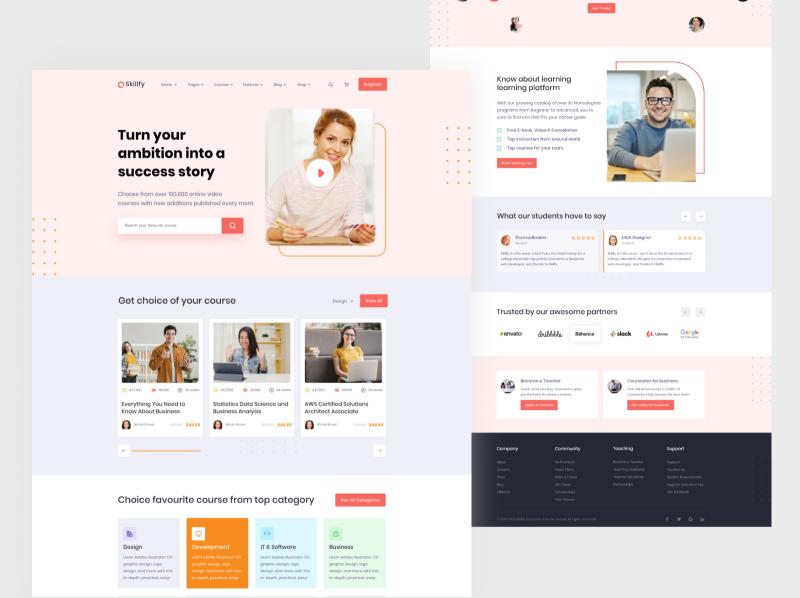What do you learn in the course of website building?
The content covered in a website building course can vary depending on the level of the course (beginner, intermediate, or advanced) and the specific platform or coding languages covered. However, a comprehensive website building course typically includes the following key topics:
Introduction to Web Development:
- Overview of web development and the role of website building.
- Understanding the difference between front-end and back-end development.
HTML (Hypertext Markup Language):
- Basics of HTML syntax and structure.
- Creating HTML documents and understanding elements.
- Working with HTML tags to define page content.
CSS (Cascading Style Sheets):
- Introduction to CSS for styling web pages.
- Applying styles to HTML elements, including colors, fonts, and layouts.
- Understanding CSS selectors and specificity.
Responsive Web Design:
- Basics of responsive design to ensure websites work well on different devices and screen sizes.
- Use of media queries to adjust styles based on device characteristics.
JavaScript:
- Introduction to JavaScript for adding interactivity and dynamic elements to web pages.
- Basic programming concepts like variables, loops, and functions.
- Event handling and DOM manipulation.
Web Design Principles:
- Understanding design principles such as layout, color theory, and typography.
- Best practices for creating visually appealing and user-friendly websites.
Introduction to Website Builders:
- Overview of popular website builders and their features.
- Hands-on experience using a website builder to create a basic website.
Content Management Systems (CMS):
- Introduction to CMS platforms like WordPress.
- Installing and customizing a website using a CMS.
Domain and Hosting Basics:
- Understanding domain names and how to register one.
- Basics of web hosting and connecting a domain to a website.
Introduction to Coding:
- Overview of coding languages and their roles in web development.
- Basic coding concepts to provide a foundation for further learning.
Version Control with Git:
- Understanding the basics of version control.
- Using Git for tracking changes in code and collaborating with others.
Web Development Tools:
- Familiarity with web development tools and IDEs (Integrated Development Environments).
- Use of browser developer tools for debugging and testing.
Web Security Basics:
- Introduction to web security principles.
- Best practices for securing websites and protecting against common threats.
Search Engine Optimization (SEO):
- Basics of SEO for improving a website's visibility on search engines.
- Optimizing content and meta tags for search engine ranking.
Launching and Maintaining a Website:
- Steps to launch a website on the internet.
- Basic website maintenance tasks and updates.
Portfolio Development:
- Guidance on building a portfolio showcasing the skills learned in the course.
- Tips for presenting work effectively to potential clients or employers.
Project Work and Case Studies:
- Practical projects and case studies to apply learned concepts.
- Real-world examples to reinforce understanding.
These topics provide a well-rounded foundation for individuals interested in building websites. It's important to note that courses may vary in their emphasis on coding, design, or specific platforms, so aspiring web developers may choose courses aligned with their interests and goals.
What specific topics or techniques are covered in a website building course?
Website building courses can vary in scope and depth, but they generally cover a range of topics and techniques to equip you with the skills to create functional and appealing websites. Here are some common areas you can expect to learn about:
Foundation and Fundamentals:
- Web Concepts: Understanding internet fundamentals like domain names, web hosting, HTTP protocols, and website structures.
- Front-End Development Languages: Learning the essentials of HTML, CSS, and JavaScript to build the website's layout, styling, and basic interactivity.
- Web Design Principles: Exploring visual design principles like typography, color theory, layout and composition to create aesthetically pleasing websites.
Building Techniques:
- Website Builders and Content Management Systems (CMS): Familiarizing yourself with popular platforms like Wix, WordPress, Squarespace, and their functionalities for building and managing websites.
- Responsive Design: Mastering techniques to ensure your website displays and functions well on various devices, from desktops to mobiles.
- Web Accessibility: Learning to build websites that are inclusive and accessible to everyone, regardless of ability.
- Search Engine Optimization (SEO): Understanding how to optimize your website for search engines and improve its visibility in search results.
Advanced Techniques (Depending on the Course):
- Database Management: Integrating databases for dynamic content and user interactions.
- E-commerce Development: Building online stores with shopping cart functionality and payment gateways.
- API Integration: Connecting your website to external services and applications.
- Web Security: Understanding common web security vulnerabilities and implementing best practices for protection.
- Version Control Systems: Using tools like Git for version control and collaborative web development.
Additional Learning:
- Software Tools: Familiarization with design tools like Adobe Photoshop and Sketch, code editors like Visual Studio Code, and website development tools specific to the chosen platform.
- Project Management: Understanding basic project management skills for planning, organizing, and delivering website projects efficiently.
Remember, the specific topics covered will depend on the type of course you choose. Beginner courses will focus on foundational concepts and practical skills, while advanced courses may delve deeper into specific technologies and frameworks.
Tips for Selecting a Course:
- Assess your skill level: Choose a course that matches your prior knowledge and experience.
- Consider your goals: What do you want to achieve with your website?
- Evaluate the curriculum: Look for a course that covers the topics you're interested in and uses platforms or technologies you want to learn.
- Read reviews and compare options: Before committing, research different courses and instructors to find the best fit for your needs and learning style.
I hope this gives you a comprehensive overview of what you can expect to learn in a website building course. Good luck on your journey to creating and building the website of your dreams!


